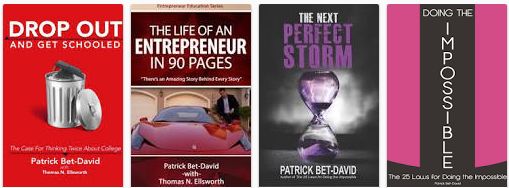Patrick Bet-David Interview: How Entrepreneurs Find Success
Learn What it Takes to Scale Your Business in this Interview with Patrick Bet-David
Are you a budding entrepreneur or small-business owner wondering what it takes to catapult your company or idea to the next level?
Providing amazing customer service, developing your brand for reputation marketing and creating a lead-generating website are important, but first you need to seize the drive inside you.
How can you harness your passion and overcome obstacles? What strategies and tactics can you employ to find success? Simply put, what does it take to rise to the top?
We spoke with influential entrepreneur Patrick Bet-David and asked him to share his secrets so you can learn the art of mastering the mindset and skills you need to grow your business.
Before we get to our interview with Patrick Bet-David, let’s review who Patrick Bet-David is and what defines his own reputation so you can appreciate his business advice.
Who Is Patrick Bet-David?
Patrick Bet-David is a business advisor and entrepreneur who shares thought-provoking perspectives on what it takes to succeed in business.
The author of several books, he has a passion for teaching the fundamentals of entrepreneurship based on his first-hand understanding of what “rags to riches” means.
The son of Iranian refugees, Bet-David got his start before the age of 30 by founding the financial-services company, PHP Agency, after serving in the U.S. military.
He is now a best-selling author, motivational speaker, podcaster and YouTuber dedicated to helping entrepreneurs and small-business owners get ahead.
Patrick Bet-David Books: What Has He Written?
Patrick Bet-David has written multiple best-selling business books to inspire entrepreneurs to fulfill their dreams.
Patrick Bet-David books include:
- Your Next Five Moves: Master the Art of Business Strategy
- Solve for X: How Great Entrepreneurs Think and You Don't (Yet)
- Drop Out and Get Schooled: The Case for Thinking Twice About College
- The Life of an Entrepreneur in 90 Pages: “There’s an Amazing Story Behind Every Story”
- The Next Perfect Storm
- Doing the Impossible: The 25 Laws for Doing the Impossible

Patrick Bet-David Podcast
Patrick Bet-David’s podcast, Bet-David Podcast, has released hundreds of episodes in which Bet-David and guests discuss trending topics as they relate to life & business.
Bet-David also regularly interviews business executives, entrepreneurs and influential figures to pick their brains about what it takes to be the best at what they do.
We recommend it as one of our best podcasts for business owners.

Patrick Bet-David Interview: Our Conversation with Bet-David About Success
Below is our interview with Patrick Bet-David. Learn about his inspiring story and what advice he gives to up-and-coming business owners to get ahead in their entrepreneurial journey.
For the few readers not familiar with you, could you share a bit about yourself?
I was born in Iran and lived there for ten years. My family escaped six weeks after Khomeini died in 1989. We left for a refugee camp in Germany where we stayed for about two years.
Eventually we came to the States and moved to Glendale, California. I went to school right afterwards, then went into the military where I joined the 101st Airborne.
When I got out of the military, I decided to become a financial advisor the day before 9/11. I worked at Transamerica for over seven years before starting an agency called PHP Agency.
I started PHP Agency in October 2009 with about 66 agents out of Northridge, California. Now we have over 5,000 agents in 49 states.
At about the same time I founded PHP Agency, I started dabbling in social media. A few friends suggested I start a YouTube channel, which I did in November 2012. That kind of grew from what it was back then to over three million now. It’s been a fun journey with that YouTube channel called Valuetainment.
What do you think it takes to be a successful entrepreneur?
I think the more clarity you can have on what you are solving.
What I mean by that is a lot of times, you’ll have somebody who will say I want to be the next Mark Zuckerberg, the next Elon Musk, the next Steve Jobs or whomever it may be.
You’re almost always going to be disappointed with that mindset because if the solution is purely coming from competition, there’s always going to be somebody bigger in the marketplace.
There is a good joke about Jeff Bezos becoming the richest man in the world for only four hours because Bill Gates once reclaimed his spot as the world’s wealthiest person. It’s always going to be changing. Nobody stays at the top from the beginning and dies being at the top forever. There’s always going to be competition.
The first step is being clear about the industry you choose. You have a lot of different industries, and typically I suggest you choose something that you’re familiar with.
For instance, let’s just say my dad was a realtor who owned 17 properties and I watched him negotiate, under stress, going through some highs and lows. I was looking at him when he was doing very well and the market tanked. When it did, he capitalized on this and I saw some areas where he made mistakes and others he did well in.
So maybe I have a little bit of an extra edge on somebody because I saw my dad do real estate my entire life, so maybe that’s something I can get into.
If you choose to become an entrepreneur and you’re not willing to have 60-, 80-, 100-hour weeks, the game is not for you.
Somebody else may say, “When I was growing up, I was a bodybuilder or an athlete and went to the college level.” When I was at the college level and played football, I noticed I didn’t like the equipment. It sucked in high school.
What if we can find some that’s not as pricey as Under Armour or Nike that I can get made cheaper and the quality is good? Then I can compete with that market and start up with some high schools because I know that.
The next step is positioning, and what I mean by that is, it’s always important if you can have somebody to watch or shadow.
Bruce Lee had someone to shadow before bringing his art to the States. Every single person had someone they shadowed. Jordan shadowed David Thompson and Julius Erving. Kobe shadowed Jordan. Lebron shadowed a lot of these guys; Magic, M.J., Kobe.
If you can find somebody you can watch and shadow, and work in an environment where you can study what’s right and not being done, that helps you.
The last one is realizing where you fit well, and what I mean by that is, am I the sales guy? Maybe I’m good with numbers. Maybe I want to be a CFO, maybe I want to be a good Chief Operating Officer. Maybe I make a good founder or innovator, maybe I’m the ideas guy. Maybe I’m the engineer.
Sometimes we think entrepreneurship is just about you starting the business. Sometimes you may start a business with a few other people, some you give equity, and you’re using their strength in a way that helps you build the business. And you still own a piece of that, so you still end up getting a victory.
There’s not really one way to provide an answer to that question, but those are some of the things I would share with someone who wants to become an entrepreneur.
Most know that for entrepreneurs to succeed it requires hustle and commitment. Is there a formula for success or something that gives them an edge?
If you choose to become an entrepreneur and you’re not willing to have 60-, 80-, 100-hour weeks, the game is not for you. Because someone is going to put you out of business. It’s just not going to happen, you’re not going to be able to stay competitive enough in a marketplace, depending if you want to scale your business. You have to have a work ethic.
I remember when I first got started, my dad was a 99-cent store cashier, and when we lived in Iran, if there’s one thing I saw my dad do, it’s that he worked hard. He would leave everyday at five in the morning and come home every night at 9 p.m., and he did that six days a week, because in Iran your Sunday here in the States is Friday.
So I picked up the work ethic from him, and when I got into business, my confidence came from knowing I’m not afraid of working hard.
The second thing is, your speed of learning and your speed of improving.
So back in the day when Bally Total Fitness used to be around, I’d watch these guys making phone calls and their style of selling, and I was frightened of making phone calls.
I would look at one guy and note how he uses charisma; every time he makes phone calls he’s smiling. Or I would notice the other guy and how his pacing is so smooth that he’s not talking fast. Or the way another guy talks, if he called me like that I would have never done business with him.
So it was good for me not to sound like that. Or I like how one guy sounds non-threatening, or that question was phenomenal, or I really like what he said when that person gave that objection.
So I would make a list, grab my recorder and give all the objections & rebuttals. Then all of a sudden I became rookie of the month, rookie of the quarter, rookie of the year, and I’m running one of the bigger clubs. I watched a lot of my peers and how they took their time on improving.
They weren’t that detailed about how to improve their game. They learned the basics like everybody else, and then stopped paying attention to the details.
So, number one is outwork, number two is out-improve, and number three is outlast. Let me explain “outlast.”
Business is purely a game of momentum. Anybody who we see who might be “God-like,” some people might say, “Oh my gosh, that guy has some genes; he is just absolutely amazing, so fantastic, and he’s so much above everybody else.” We look for so many reasons.
To bring you to a lower level, a person could be a realtor in Vancouver, and there is this one realtor in Vancouver who everybody knows. Her picture is everywhere, she’s on every brochure, bench, billboard and magazine. Everywhere you look, you see her face. And another realtor says “Well, the reason she does so well is she’s attractive.” Or another excuse might be that she has a nice car or something else. But the reason she did well is because she lasted.
Momentum compounds. If I go fully focused at 60 hours a week for three years, you go for five years and another guy goes for ten years.
Even if the guy who goes for ten years has half the talent that you or I have, he has lasted longer than us. Because of that, he has the bigger opportunity for compounding effort and exponential growth to take place in his business.
You don’t hear many talking about exponential growth or compounding effort because we’re always trying to figure out the secret right now.
To give you an example I’ll share what happened yesterday. I just flew into L.A. two hours ago.
I’m based out of Dallas right now. I run an insurance company. Yesterday we sold more insurance in a single day than we sold in my first five years of being in business. That’s roughly 1,800 days.
How is that even possible? I’ve been in the business for 15 years and the compounding effort has gotten to such a level that it’s no longer fair because the doubles are bigger doubles.
Unfortunately, very few people can last that long because they eventually have a certain level they hit, get on cruise control and wonder why they’re not having the next level of success.
You have to outwork your marketplace, improve very fast and have stamina. You have to be able to last, to give yourself a standing shot of making it in business.
How important is it for entrepreneurs to have a mentor?
I think it’s very critical for entrepreneurs to have a mentor.
If you look at the formula and how the man upstairs created it, he may have even given us a model for that.
Kids need a mentor. The way the system was created, kids will eventually become mentors to their own kids. Our first mentors who we have are our own parents and our siblings, then teachers and other people.
Some people will say, “There’s just not that many mentors in the city I live in” or “Most of my mentors are dead mentors.”
Your mentor doesn’t necessarily need to be a face-to-face mentor. There’s a lot of ways to find a mentor nowadays. We have access to YouTube where someone can sit to watch hundreds of hours of video. And the person teaching has no idea that a viewer has been studying him and takes his business from $200,000 a year to $2.8 million.
Mentors are everywhere. If you are one of the fortunate ones with access to somebody locally, who can give you direction, whom you can shadow and watch what they’re doing, you have an edge. But if you don’t have that, the alternative is better than it was 20 or 30 years ago.
What sort of hurdles do you believe prevent entrepreneurs from realizing their full potential?
Full potential is different from success because almost everyone I know who’s started some kind of a business has experienced some results. Full potential is self-sabotage with victories.
Let’s pick a guy named “Bob.” The most money Bob has ever made is $4,000 in a month. You will learn a lot about Bob when he makes $20,000 in a month, because when he makes that, there’s typically a few different ways to respond to it.
One is when they respond with, “Oh my gosh, I just made $20,000 this month. That’s five months of my income.” So they go on cruise-control for the next five months before they run out of that money and then they’re back into panic mode. Then they start making money again because they’re panicking. The only way they’ve made money is to survive.
Another guy will make $20,000 in a month and say “Oh man, I made $20,000, but Jack’s making $30,000, so I have to make $30,000 to get that Mercedes-Benz AMZ. But then he drives a BMW 7 Series, so I have to get an S550 Mercedes, that’s what I need to do and I need to get to $30,000. So I’m going to get that car, buy a Rolex, buy a new suit….” And they buy, buy, buy, thinking they’ve already got there.
Then there’s another guy who makes $20,000 and he tells himself, “I made $20,000 in a month but it’s not going to make me financially free, so I need to make more money.” And they base the money on a “freedom number”; for instance, “I will be free once I have three million dollars in my bank account.” There’s a formula to it, if they make that money.
Then there is the last person who makes the money based on a purpose they have. What I mean by this is the purpose isn’t just to make money.
You have the lowest level, survival.
Second level is status, such as, “I have to do better than my cousin, sister, brother, best friend, etc.”
Number three is freedom. I actually need two million dollars to be financially free so I can pay off the kids’ schooling, maybe the house, and have some extra set aside for retirement.
The last one is purpose. Purpose is bigger. I’ve been put on this planet, have an incredible life, I’m grateful for my parents and the country I live in, the money I’ve made, the industry I found, the wife, family & friends, and all this other stuff.
I don’t think I was put on this planet just to make money. I’ve got to make a difference and I’ve got to give back.
So I’m going to go out there and contribute. I’m going to build some leaders, develop some people and do something that’s going to benefit other people. Then it becomes purpose.
When you ask that question on “full potential,” I want to make sure I unpackage it so it’s not just me giving a general answer.
The biggest enemy people have against reaching their potential is success. They reach a little bit of success and they don’t know what to do with it.
When you think back to when you started out, are there ways to deal with or avoid common issues that entrepreneurs experience in the early stages of their journey?
Habits.
If you have a big month, you get comfortable. You make money, you spend money and you overspend. You just hire people you know and you can’t hire people who are better than you because your ego is too big so you can’t hire somebody better than you because you’re threatened by it. You’re afraid of them.
Habits. Once you learn a few little tricks to the game, you stop improving, you stop reading books, you stop developing and you stop getting out there like you once did.
If you give me somebody who’s winning at a high level consistently for a decade and if we were to talk with the same guy to give us other people within the same field who at one point were beating him, and sit down and ask what happened with those other people, you will know that the difference between the two people are generally habits.
There are a lot of athletes who were amazing and who had bad habits. Darryl Strawberry, Dwight Gooden, Lawrence Taylor, etc. It’s a long list of names. These guys had bad habits so they could have been bigger than what they were but they had some bad habits.
In business sometimes, if you’re running & gunning and you don’t have an outlet to talk to a community that’s similar to you, you may have an escape that nobody else knows about.
For instance, you can’t come home and talk to your wife about the business because she might say, “Why don’t you just go get a job and be an engineer like you once used to be? I told you not to start a business.”
All of a sudden your escape becomes having two shots of whiskey in the middle of the day, doing drugs on the side or having a gambling habit.
Every one of these things I’m telling you I have advised somebody who was going through this. And they were going through it alone because the lingering issues of them needing an escape led to these bad habits.
Sometimes having an escape is talking to people similar to yourself who are startup entrepreneurs facing similar struggles, preferably somebody who’s maybe a phase or two ahead of you, and can say, “What you’re going through is normal. Be patient. Don’t make the big mistake, it’s all going to work out,” so you don’t think you’re all by yourself going through it.




